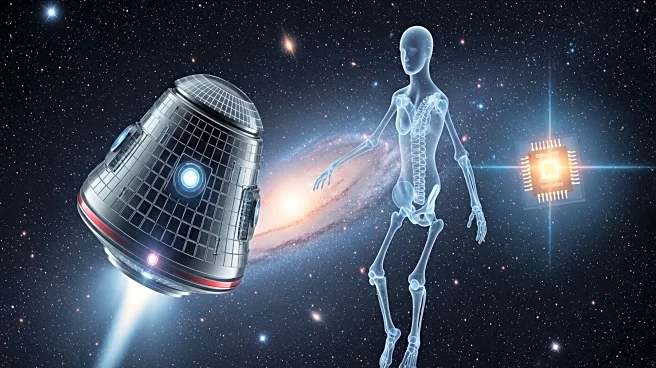What's Happening?
NASA is conducting significant research aboard the International Space Station (ISS) focusing on bone loss and advanced transistor technology. Astronauts Zena Cardman and Jonny Kim are processing bone stem cell samples in the Kibo laboratory module to understand the effects of microgravity on bone tissue. This research aims to safeguard astronauts' skeletal systems and potentially treat bone diseases on Earth. Additionally, NASA Flight Engineer Mike Fincke is involved in unpacking hardware from the Dragon spacecraft and practicing maneuvers with the Canadarm2 robotic arm. Meanwhile, JAXA's Kimiya Yui is working on fiber manufacturing hardware and installing new experiment gear to study space radiation's impact on transistor technology. The ISS is preparing for the 23rd Cygnus cargo mission, scheduled to launch on September 15, which will deliver over 10,000 pounds of supplies and scientific investigations.
Why It's Important?
The research on bone loss and transistor technology aboard the ISS has significant implications for both space exploration and terrestrial applications. Understanding how microgravity affects bone tissue can lead to advancements in treating osteoporosis and other bone-related conditions on Earth. The study of space radiation's impact on transistors is crucial for developing more resilient technology for space missions, which can also enhance electronic devices used on Earth. The upcoming Cygnus mission will provide essential supplies and scientific equipment to support ongoing research, ensuring the sustainability of long-term space missions and contributing to scientific knowledge that benefits humanity.
What's Next?
The Cygnus cargo mission is set to launch on September 15, carrying vital supplies and scientific equipment to the ISS. This mission will support the Expedition 73 crew and facilitate further research in space biology and technology. As the research progresses, findings from the bone loss and transistor studies will be analyzed and potentially applied to medical and technological advancements on Earth. The continued collaboration between NASA, Northrop Grumman, and SpaceX highlights the importance of international partnerships in advancing space exploration and scientific discovery.
Beyond the Headlines
The research conducted on the ISS not only advances scientific understanding but also raises ethical and cultural questions about the future of space exploration. As technology evolves, considerations about the long-term impact of space missions on human health and the environment become increasingly important. The collaboration between different space agencies reflects a global effort to address these challenges and ensure the responsible use of space technology.









